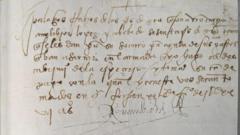The FBI has successfully returned a 500-year-old manuscript page, signed by the infamous Spanish conquistador Hernán Cortés, to Mexico. This document, written in 1527, is one of a set of 15 pages believed to have been taken from Mexico's national archives between 1985 and 1993, as reported by the United States investigatory agency. The page, which outlines expenditures made for supplies during Cortés's expeditions, was discovered in the United States and officially repatriated on Wednesday.
Cortés, known for conquering the Aztec empire and facilitating Spanish colonization in the Americas, penned the manuscript while serving as the governor of New Spain. The historical document details logistics for Cortés's undertakings throughout what is known today as Mexico and beyond. At its peak, New Spain encompassed a vast swath of territory across North and Central America and extended into South America.
The document was acknowledged by Mexico's national archives but discovered to be missing when a microfilm of the collection was made in 1993. Interestingly, a wax number applied by archivists in 1985-1986 indicated it had been taken sometime during the cataloging processes. In 2024, following a formal request from the Mexican government, the FBI's art crime team sprang into action to locate the stolen pages, compiling notes about the theft and the condition of the remaining documentation.
Though the FBI has not disclosed hot the manuscript came to be found in the US or who originally owned it, Special Agent Jessica Dittmer highlighted that no prosecutions would occur due to the document changing hands multiple times since the theft. Dittmer stated, "These types of pieces are protected cultural assets representing important moments of Mexican history, making their recovery vital for informing our understanding of the past."
The return of this document is particularly noteworthy amidst ongoing tensions between the US and Mexico regarding issues such as border security and tariffs introduced during the Trump administration. However, the FBI maintains that the United States holds a responsibility to combat the antiquities trafficking, considering its role as a major consumer of historical artifacts.
Dittmer reassured that efforts are ongoing to locate and repatriate the remaining pages still missing from the collection. This marks a continuation of initiatives supporting the return of cultural heritage, with the FBI previously returning another document signed by Cortés to Mexico in 2023. As the reverberations of colonialism continue to impact indigenous communities, the importance of rectifying historical wrongs remains ever-present.
Cortés, known for conquering the Aztec empire and facilitating Spanish colonization in the Americas, penned the manuscript while serving as the governor of New Spain. The historical document details logistics for Cortés's undertakings throughout what is known today as Mexico and beyond. At its peak, New Spain encompassed a vast swath of territory across North and Central America and extended into South America.
The document was acknowledged by Mexico's national archives but discovered to be missing when a microfilm of the collection was made in 1993. Interestingly, a wax number applied by archivists in 1985-1986 indicated it had been taken sometime during the cataloging processes. In 2024, following a formal request from the Mexican government, the FBI's art crime team sprang into action to locate the stolen pages, compiling notes about the theft and the condition of the remaining documentation.
Though the FBI has not disclosed hot the manuscript came to be found in the US or who originally owned it, Special Agent Jessica Dittmer highlighted that no prosecutions would occur due to the document changing hands multiple times since the theft. Dittmer stated, "These types of pieces are protected cultural assets representing important moments of Mexican history, making their recovery vital for informing our understanding of the past."
The return of this document is particularly noteworthy amidst ongoing tensions between the US and Mexico regarding issues such as border security and tariffs introduced during the Trump administration. However, the FBI maintains that the United States holds a responsibility to combat the antiquities trafficking, considering its role as a major consumer of historical artifacts.
Dittmer reassured that efforts are ongoing to locate and repatriate the remaining pages still missing from the collection. This marks a continuation of initiatives supporting the return of cultural heritage, with the FBI previously returning another document signed by Cortés to Mexico in 2023. As the reverberations of colonialism continue to impact indigenous communities, the importance of rectifying historical wrongs remains ever-present.


















